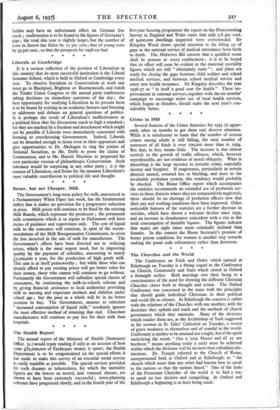The Churches and the World The Conference on Faith and
Order which opened at Edinburgh on Tuesday is a fitting sequel to the Conference on Church, Community and State which closed at Oxford a fortnight earlier. Both meetings owe their being to a consciousness of the need for drawing the different Christian Churches closer both in thought and action. The Oxford Conference was concerned in the main with the principles that should guide individual Christians in their political and social life as citizens. At Edinburgh the concern is rather with the relations of the Churches with one another, with the doctrines they uphold and teach and the methods of church government which they maintain. Many of the divisions which sunder them are, as the Archbishop of York suggested in his sermon in St. Giles' Cathedral on Tuesday, a source of grave weakness to themselves and of scandal to the world. Uniformity is neither to be attained nor sought, but if the spirit underlying the words " One is your Master and all ye are brethren " means anything today a unity must be achieved within which the divisions will be no more than subsidiary dis- tinctions. Dr. Temple referred to the Church of Rome, unrepresented both at Oxford and at Edinburgh, as " the church which more than any other had known how to speak to the nations so that the nations heard." One of the tasks of the Protestant Churches of the world is to find a way to speak no less decisive and compelling. At Oxford and Edinburgh a beginning is at least being made.






































 Previous page
Previous page